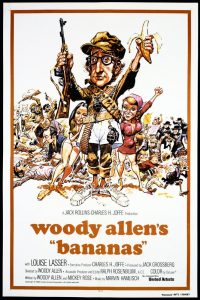 I must say, the title of this film is very apt. From the scene where Fielding is talking to his therapist about being repeatedly electrocuted as a child by his heated blanket, to his masquerade across San Marcos and becoming their figurehead, to his fantastical, on and off, yet very dry relationship with Nancy, this film could be summed up in one word: bizarre. Yet, beneath its slap stick/ dead pan exaggerated humour (which I didn’t think could coexist, yet arguably function quite well together in this film), I felt that “Bananas” was very successful in poking fun at some of the realities of politics, romance, and society.
I must say, the title of this film is very apt. From the scene where Fielding is talking to his therapist about being repeatedly electrocuted as a child by his heated blanket, to his masquerade across San Marcos and becoming their figurehead, to his fantastical, on and off, yet very dry relationship with Nancy, this film could be summed up in one word: bizarre. Yet, beneath its slap stick/ dead pan exaggerated humour (which I didn’t think could coexist, yet arguably function quite well together in this film), I felt that “Bananas” was very successful in poking fun at some of the realities of politics, romance, and society.
One of the interesting ways that the film “poked” fun at society was through its depictions of American news casts that in my opinion emphasized the power of “the gaze.” By this I am referring to the opening and closing scenes of the film in which news casters got close and personal with people experiencing very emotional events – in the first scene witnessing the death of the old president of San Marcos, and in the last, watching and discussing the consummation of Fielding and Nancy’s marriage. Especially in regards to the opening scene, I felt this was quite characteristic of the way in which Western news can focus on the violence in other countries and normalize it. The news caster was quite blunt about the shooting of the president and held a calm composure. He depicted the event as being quite normal, to the point that he went up to talk to the president about it after he had been shot, and finished his conversation by saying something along the lines of ‘well good luck to you.’ In comparison to coverage of American politics, I doubt something like that would ever be shown so publicly on television, especially with such a normalcy to the way the news caster made the event come across. I recognize that this was fictional and exaggerated, but still could be representative of the way in which Americans/Westerners view other societies with more of a gaze of feeling the authority / privilege to invade on their private matters and publicize them with their own perspective attached, which can normalize violence amongst other things in other countries.
president and held a calm composure. He depicted the event as being quite normal, to the point that he went up to talk to the president about it after he had been shot, and finished his conversation by saying something along the lines of ‘well good luck to you.’ In comparison to coverage of American politics, I doubt something like that would ever be shown so publicly on television, especially with such a normalcy to the way the news caster made the event come across. I recognize that this was fictional and exaggerated, but still could be representative of the way in which Americans/Westerners view other societies with more of a gaze of feeling the authority / privilege to invade on their private matters and publicize them with their own perspective attached, which can normalize violence amongst other things in other countries.
Additionally, although there was a satiric lens across the whole film, as others have pointed out in their posts, the representation of the fictional Latin American country, San Marcos, seemed to be portrayed as more violent, amongst other things in comparison to the US. This has been similar to other films we have viewed in this class in its emphasis on violence, sexual liberation, and corrupt governments. Although “Bananas” highlights everyone in the film as being a bit of an “idiot” (not sure if quotations are even needed there), this film is no different in its representation of Latin ![]() America. I still haven’t fully wrapped my head around some of the intentions of this film, likely due to its fast paced nature, and unique comedy style, but it was definitely a film to think about, and if nothing else, it was definitely worth a good laugh.
America. I still haven’t fully wrapped my head around some of the intentions of this film, likely due to its fast paced nature, and unique comedy style, but it was definitely a film to think about, and if nothing else, it was definitely worth a good laugh.
In regards to your final paragraph, I agree with your point that the violence in San Marcos was portrayed as more drastic as compared to the violence in the United States. I felt though that he was still able to carry the message that the US intervention in these countries is problematic. In my opinion, this film was very different in its representation of latin America and was the most critical and anti-american film we have seen.